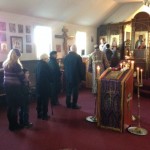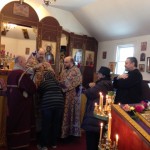On March 16, on the Second Sunday of Lent we had a nice celebration in St. George Church. Our Rector, Archpriest Igor Tarasov served the Divine Liturgy. After the reading from the Holy Gospel he preached a homily:
“On the Second Sunday of Lent we are called to reflect upon our salvation. On this day the Church commemorates our Father among the Saints, Gregory Palamas who was a great theologian and spiritual writer. In his writings he stressed the idea that men are able to obtain the divine energy, the grace through spiritual life of prayer and devotion. He wrote that godly people may become partakers of the Divine nature. This is an important way of salvation. But among other things, salvation means forgiveness of our sins. Today’s Gospel reading tells ua about God’s power to forgive. This power was possessed by the Son of God and then given to the Church who now is able to absolve us from our sins in the Mystery of Penance. That Sacrament requires our conversion; it does not work automatically. If we repent and show compunction, then God through the ministry of the Church will forgive us. In a similar way, today’s Epistle lesson is telling us about the importance of our cooperation with God for our salvation. St. Paul is warning us and says, “We must give the more earnest heed to the things we have heard, lest we drift away. For if the word spoken through Angels proved steadfast, and every transgression and disobedience received a just reward, how shall we escape if we neglect so great a salvation…” (Heb. 2, 2-3). St. Paul is warning us that we should be watchful and give a lot of attention to the spiritual matters. Otherwise we may drift away from salvation; otherwise we may not escape being condemned by God at the end of days.”
“Our salvation is the most important goal of our life. The dogma of salvation is the central dogma of Christianity, the very heart of our faith. Our Lord Jesus Christ is the Redeemer and Savior of all mankind. Because of Christ’s birth, His Incarnation and His life lived for our sake, crowned with His death and Resurrection, we see how infinitely important mankind is to Almighty God. We are precious for Him, and His mercy endures forever. God took upon Himself our guilt, our sins and our faults. He is the Lamb slaughtered for an ungrateful world. This is the heart of human history, the very reason why we were created.”
“Some Christian churches stop here and make a conclusion that Christ has already accomplished everything for us: He redeemed and saved us, thus we are saved if we accept Him and believe in Him. But we, being a traditional Church, a Church which follows the teaching of the Holy Fathers, do not stop here. We add something else because we cannot be sure that if we are called for salvation, then we are already saved. Salvation must be deserved. This is why we say that in order to be saved we need to do the works of faith. St. Gregory the Great (not St. Gregory Palamas whom we honor today, but another St. Gregory, the pope of Rome) wrote, “Perhaps each of you will say to himself: I have believed, I shall be saved. He speaks what is true if to faith he joins good works. That indeed true faith which does not deny in work what it professes in word. For this Paul says of certain false faithful: “They profess to know God, but in works they deny Him” (Tit. 1, 16). For this John also says: He who says that he knows God, “and keeps not His Commandments, is a liar, and the truth is not in him” (1 Jn. 2, 4)”.”
“One of such works of faith is our repentance which is so important to receive forgiveness of our sins. This is why we are reminded about it during this blessed time of fast and on this Second Sunday of Lent.”
“Dear brothers and sisters! Salvation is not something already done. It is a process that is, at the same time, past, present, and future. There is nothing in the Scripture and in the Fathers to defend the idea that all one has to do to be saved is to profess that “Jesus is Lord” and your salvation is assured! Salvation is not momentary; it is a life-long process. Christ Himself said, “Not everyone who says to Me, ‘Lord, Lord,’ shall enter the Kingdom of heaven, but he who does the will of My Father in heaven” (Mt. 7, 21). Also St. Paul stated that we need to work out our own salvation with fear and trembling (Phil. 2, 12). This is why those who teach that salvation is done after your mere statement of belief, or after some “holy moment”, are very wrong.”
“Every Christian can say, “I was saved when Jesus died for me on the cross”. But he should continue, “I am saved because I accept Redemption as part of my Baptism into the very life of Christ. Christ is my Savior, but I must prove that I believe He is my Lord by my long-life actions as a faithful Christian.” Finally everyone can say, “I will be saved when my earthly life is over and I will be judged as to whether my actions supported my words of faith in Christ as Lord and Savior”. This is why in answering the question, “Are you saved?” the Fathers respond, “I am being saved.” Anything other than this is sheer presumption on our part, and against the teaching of Christ!”
“Dear brothers and sisters! Let us not neglect so great a salvation offered to us by the Lord. Let us respond to God’s power of forgiveness by good works of faith, by repentance, so we may indeed become saved.”




